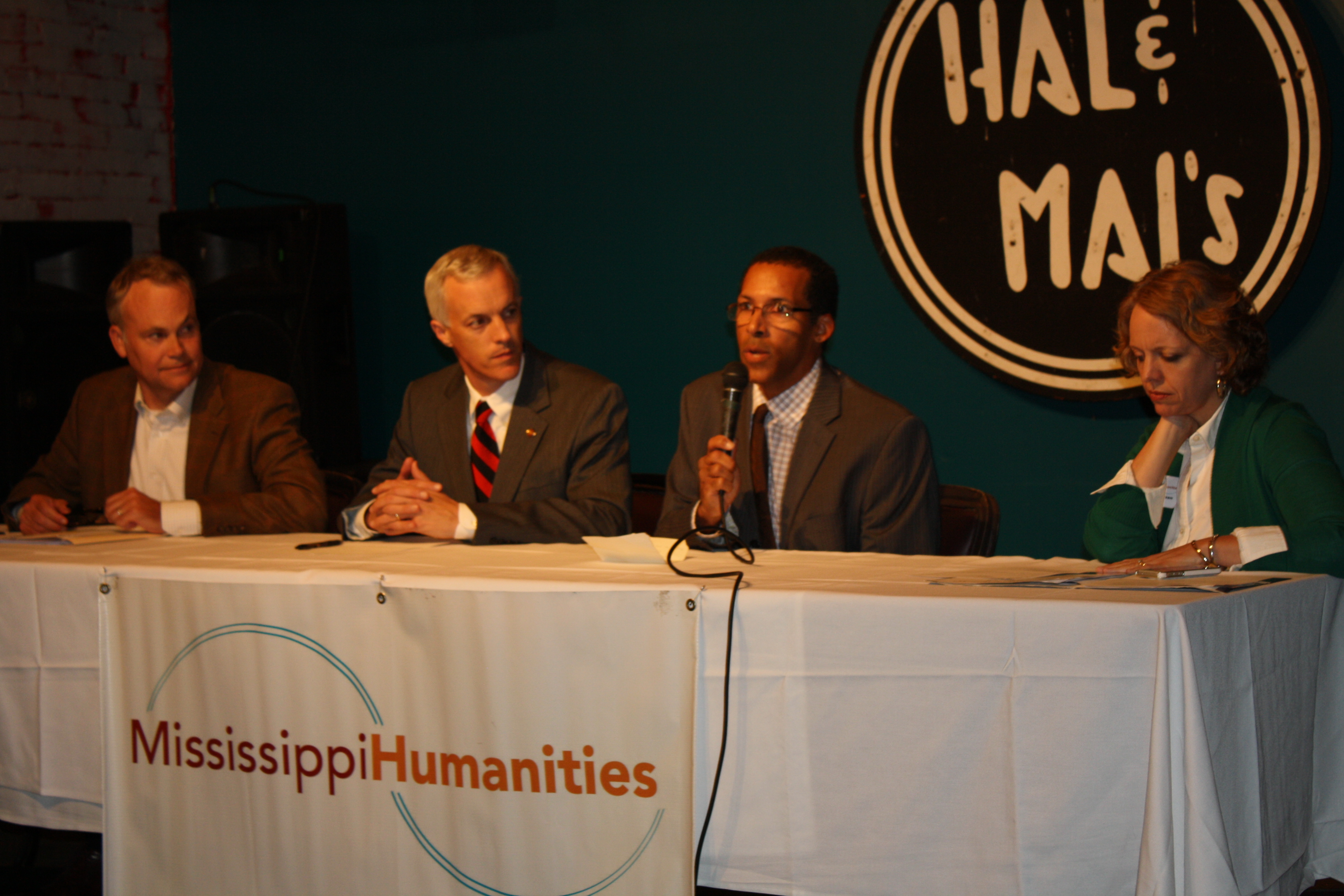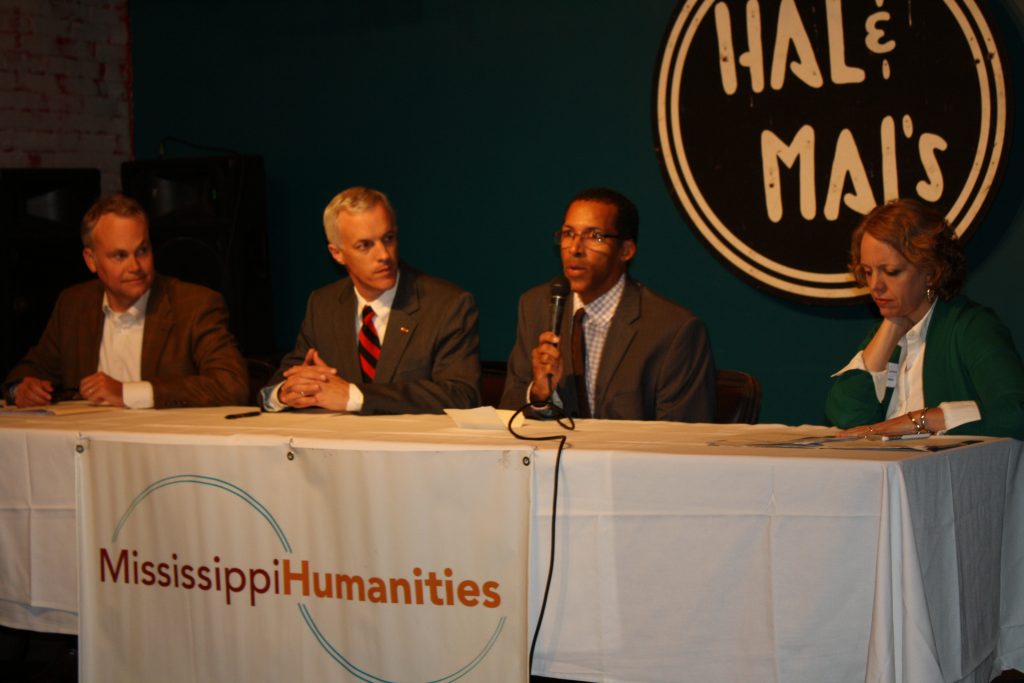
Panel discusses effects of Voting Rights Act of 1965
By Shanderia K. Posey
Editor

In a matter of days, Mississippians will head to the polls to cast their ballot in national, state and local races. That is, if they decide to vote at all. The contention in the 2016 presidential race between Hillary Clinton and Donald Trump has caused some registered voters to consider staying home. During the Mississippi Humanities Council’s monthly Ideas on Tap meeting Oct. 25, at Hal and Mal’s the topic was “Beyond the Voting Rights Act.”
Three panelists answered questions from the moderator and audience. Panelists were Sen. David Blount, Marvin King, Ph.D., associate professor of political science at the University of Mississippi; and Spence Flatgard, a Jackson attorney who specializes in campaign finance and election laws. Carol Andersen, assistant director of MHC, moderated the panel discussion. Andersen is also the communications director of the Jackson area League of Women Voters of Mississippi. When asked what their response would be to those considering not voting, the panelists all offered insights for not staying home on Election Day.
“Well, you’ve got two pretty different candidates and one of them is going to be president,” Blount said. “They’re going to be appointing justices to the Supreme Court and deciding whether to send our military into combat. They are going to veto bills, sign bills … and that has an effect on your life. There’s more than a dime of difference between these two candidates. It’s a very important position. It’s also your responsibility (to vote).”
“I think often people forget how much the government affects our day-to-day lives, and there’s a lot more on the ballot than just the president,” King said. “You’ve got your congressional elections; in a lot of states they’ve got their U.S. senators. In a lot of other states, not ours, you’ve got your state legislative elections and municipal elections as well.” King noted the exit signs in the room during the discussion, the roads citizens drive on and police officers monitoring those roads – all of those aspects of daily living were results of government and therefore, voting.
“There’s a pervasive effect of government and you know government is doing its job when people don’t realize the presence of government in their lives. But we have very different ways of and good questions about ‘how big and what is the government’ (and the) appropriate scope and size of government – those are good questions and good debates and the only way to settle it is through voting.
“If someone thinks ‘Oh, I’m not going to vote. I don’t like these two candidates.’ They are missing their opportunity to be a part of that debate, and the debate is going to happen whether they participate or not. If you want a say, you’ve got to vote.”
Flatgard summed it up with this, “If you don’t vote, don’t complain about the government you get.” He said voting reminds him of his grandfather who fought in World War II for his right to vote. Flatgard takes his daughter with him while voting so she can witness the process.
“It matters,” he said. This year in Mississippi, election commissioners are on the ballot. “These are honest-to-good people who run the elections,” Flatgard said. “Get to know them and vote for them.”
The 2016 presidential election is making history for lots of reasons, but primarily because for the first time ever a woman could likely become the nation’s first female president. Besides a new president, votes for judicial posts, state congressmen, Supreme Court and election commissioners will be cast in Mississippi. Another factor making the 2016 election historic is it will be the first election without the full protection of the Voting Rights Act. The Supreme Court decision in Shelby County v. Holder in 2013 ruled Section 4(b) of the Voting Rights Act of 1965 unconstitutional. Section 4(b) included the coverage formula to determine which states or local governments needed clearance from the federal government before making voting law changes. Section 5 of the Act required certain jurisdictions – specifically ones with histories of voter discrimination – to get the clearance. Without Section 4(b) being in effect, Section 5 became basically null. Throughout the event, the panelists touched on the history of the Voting Rights Act, its effect and its future.
“One of the missions of the Act was to allow more people to vote,” King noted. However, since the Constitution allows each state to determine its voting process, the system can be complicated. For example, some states allow online voter registration, but Mississippi does not. Some states allow any person to vote early, but in Mississippi only absentee voting is allowed. The effect of the Act in Mississippi was an increase of African Americans registered. Before the Voting Rights Act about 6-7 percent were registered and today about 72 percent are registered.
“That’s tremendous progress,” King said. The panelists also noted the increase of voting law changes across the country since the Shelby County v Holder decision. The effects are numerous of the Voting Rights Act but overall, it was designed to ensure a system is in place to protect citizens’ rights. “It is a strong disincentive to bad behavior,” Blount said. “It’s like a police car on the side of the road making sure you obey the speed limit.”
Shanderia K. Posey can be reached at sposey@mississippilink.com.

Be the first to comment